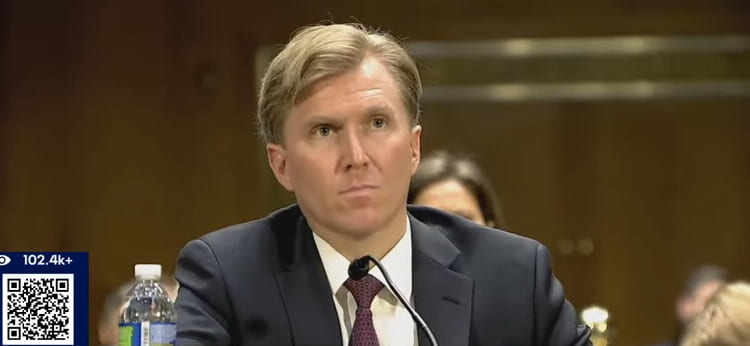The United States Senate, by a vote of 54-45, confirmed Elbridge Colby as Under Secretary of Defense for Policy. This means that the number three official at the Pentagon will be what one report described as a “hard-nosed realist” who understands America’s military strengths and limitations.
Colby served in the Pentagon during Trump’s first term and is credited with being the principal author of the 2018 National Defense Strategy, which advocated shifting America’s focus from small peripheral conflicts to great power competition. More recently, Colby has recommended prioritizing the Indo-Pacific at the expense of Europe and the Middle East. (RELATED: NATO Firsters vs. Elbridge Colby)
In his book The Strategy of Denial, Colby argues that if China establishes hegemony in the Asia-Pacific region, it will enable the Chinese Communist Party to challenge American global interests. One reviewer called it a “realist’s book, laser focused on China’s bid for mastery in Asia.” Colby calls for a U.S.-led anti-hegemonic coalition in the Indo-Pacific, including India, Japan, the Philippines, South Korea, Vietnam, and Taiwan. Colby understands that these countries have now become America’s most important allies — more important than our allies in Europe and the Middle East.
Hard-nosed realists recognize that stopping China from seizing Taiwan is more important than stopping Russia from seizing Ukraine, and more important than resolving conflicts in the Middle East. Colby has caught flak from Atlanticists and neoconservatives for voicing such opinions, but he is right. (RELATED: China’s Threat to Taiwan: Intentions and Capabilities)
Russia and Iran, to be sure, are led by awful regimes and pose regional threats, but China’s threat to U.S. interests is multifaceted and global in nature and therefore requires greater focus and greater resources. Colby recognizes that American power and resources are not unlimited. Strategy means aligning commitments with resources and directing more resources at what Clausewitz called the “center of gravity.”
In a revealing article last year, Colby proposed a strategy of “conservative realism … characterized by strategic prioritization.” He derided the liberal internationalist or progressivist strategy of “overextension without strength” that characterized U.S. foreign policy extending back to the Clinton administration. Colby described this misguided approach to the world as epitomized by “wildly ambitious goals” and a “gauzy conception of the ‘sacredness’ of alliances without real strength or prudence to back it up, sacrificing Americans’ interests for good press.” It was a foreign policy, he wrote, “of ambitious goals underwritten more by high rhetoric than real force and resolve.”
What Colby was describing is Wilsonianism — basing U.S. foreign policy on a vision or dream of what the world could be instead of shaping foreign policy for the world as it is. This vision or dream has afflicted every Democratic president from Wilson to Biden, as well as Republican President George W. Bush.
The “core conservative value” in foreign policy, Colby wrote, is prudence. When prudence is cast aside for ideological crusades, we get results like the Vietnam War and the endless wars in Iraq and Afghanistan, and a Global War on Terror.
The latest ideological crusade for the Wilsonians is “democracy vs. autocracy,” which is supposedly what is at stake in the Ukraine War and why the liberal internationalists and neoconservatives will support nothing less than victory over Russia. So we poured more and more resources into that unwinnable war, helping to fuel a conflict that has resulted in hundreds of thousands of casualties, the outcome of which has little if anything to do with the real geopolitical center of gravity — the Indo-Pacific. (RELATED: Wilsonian Foreign Policy Is Dead — For Now)
Colby is not, as some have claimed, an isolationist. Isolationism, he wrote, is not a plausible option because it would open a global power vacuum that China would be only too happy to fill. But Wilsonian “primacism,” he wrote, ignores the reality that “we simply don’t have the power to impose our will on everybody else.” Colby summed it up quite nicely: “The deepening rivalry with China, the persistence of the war in Ukraine, and the opposition of other smaller powers like Iran, North Korea, and even the Houthis shows how disconnected from reality a strategy of primacism actually is.” The gap between ends and means is astonishing.
There is only one power that threatens America globally — China, which, Colby wrote, poses a greater threat to the United States than did the Soviet Union, the Axis powers of World War II, and the central powers of the First World War. “If China could dominate Asia,” he warned, “it would have a controlling influence on most of global GDP,” and it is building a military to pursue that goal. Colby is updating Mackinder — the Indo-Pacific is now the “Heartland” of Eurasia, and whichever power or alliance of powers commands that Heartland can command the world.
Colby speaks the language of Mackinder and Nicholas Spykman and Hans Morgenthau, and Henry Kissinger. It is the language of realism, and it is why his confirmation was so important.
READ MORE from Francis P. Sempa:
Dangers of Global Governance: UN Aims for Global Carbon Tax on Shipping
Who Controls the ‘World Ocean’ Commands the World
Obama’s NATO Ambassador: Europe Capable of Running NATO Without US





![Jasmine Crockett Justifies Mass Illegal Immigration With Bizarre Argument [WATCH]](https://www.right2024.com/wp-content/uploads/2025/03/1742007023_Jasmine-Crockett-Justifies-Mass-Illegal-Immigration-With-Bizarre-Argument-WATCH-350x250.jpg)

![NYC Tourist Helicopter Falls into Hudson River, Siemens Executive and Family Among Those Killed [WATCH]](https://www.right2024.com/wp-content/uploads/2025/04/NYC-Tourist-Helicopter-Falls-into-Hudson-River-Siemens-Executive-and-350x250.jpg)








